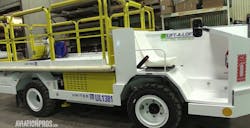WASHINGTON -- The number of passengers fined for security violations at airports fell dramatically last year as the federal government focused on more serious threats, according to records and government officials.
The Transportation Security Administration issued 4,459 fines against passengers in 2005, a 54% decrease from 2004. The vast majority of fines are doled out to people trying to bring weapons and other dangerous items on planes.
"The public has been getting better about what not to bring to the checkpoints," said Salomon Gomez, the Transportation Security Administration's assistant chief council for civil enforcement. "TSA has also gotten better. We've focused more on what will really take down a plane."
In 2004, the TSA adopted a zero-tolerance policy for passengers caught with prohibited items at airport screening checkpoints. The number of fines against passengers soared from 3,426 in 2003 to 9,741 in 2004. The policy prompted complaints from Congress about unequal enforcement and heavy-handedness.
Early last year, TSA altered its policy in an attempt to refocus on what the agency believes are greater threats to planes, such as explosives that can bring down a flight. Previously, most people who brought a small knife in a suitcase received a fine.
Those people now receive warning letters unless they have attempted to conceal the knife or exhibited threatening behavior, TSA spokeswoman Yolanda Clark said.
Fines range from $250 for minor infractions to $10,000 for passengers with explosives.
Three screeners told USA TODAY that fewer passengers are trying to carry items such as knives and tools on planes.
"The flying public is just realizing they shouldn't be carrying this stuff," said Cris Soulia, a screener at San Diego International Airport.
The TSA bans 68 items, including flammables, martial-arts weapons, tools such as hammers and drills, and sporting equipment such as hockey and lacrosse sticks and pool cues. Most of those items can be packed in checked luggage.
The TSA is also seizing fewer of the items considered most threatening at checkpoints. For example, TSA security officers in 2004 seized nearly 700,000 incendiary items, such as ammunition or dangerous flammable materials. Last year, the total fell to about 372,000 such items. The number of seized knives, other cutting devices and clubs (baseball bats, nightsticks, etc.) also fell.
The overall number of seized items rose last year because the TSA began barring lighters.
Some security analysts say that the TSA still goes too far in what it bans on flights. Charles Slepian, a New York aviation security expert and founder of the Foreseeable Risk Analysis Center, said the TSA allows passengers to carry things such as knitting needles and canes that can do just as much harm as banned items such as sharp knives and bats.
Rep. Peter DeFazio, D-Ore., a longtime critic of the TSA's fines, applauded the decrease. "I'm not hearing complaints from consumers as we were hearing a few years ago."
Copyright 2005 LexisNexis, a division of Reed Elsevier Inc. All rights reserved.
Terms and Conditions | Privacy Policy
News stories provided by third parties are not edited by "Site Publication" staff. For suggestions and comments, please click the Contact link at the bottom of this page.





